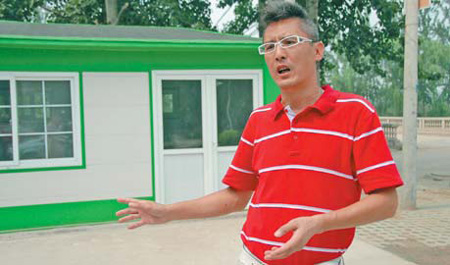'Green house' plan to improve garbage disposal
Updated: 2011-07-26 13:39
By Cheng Yingqi (China Daily)
|
|||||||||||
|
 |
|
Huang Xiaoshan says he hopes to bring enviroment-friendly ideas to more people by investing in and opening a garbage sorting station that he calls "the green house". [Photo / China Daily] |
BEIJING - Huang Xiaoshan, an environmental activist, has decided to invest in and open a garbage sorting station that he will call "the green house".
And helping him in that endeavor will be the local government. On July 20, officials with the Beijing Municipal Administration Committee paid Huang's green house a visit during which it promised to lend him some expertise in garbage sorting.
Wang Weiping, deputy chief engineer of the administration, said the government "should encourage citizens who are trying to reduce the amount of waste that they dispose of".
Before becoming an environmental activist in August 2009, Huang, 49, had been a successful lawyer.
That change in vocation came about in part in response to a government plan calling for the construction of a garbage incineration plant near his villa in Changping district. On learning of the project, Huang joined dozens of his neighbors to protest against it. He was later detained for five days for "disturbing the public order".
Later, the Beijing government invited Huang to take part in its official visits to Japan and Macao, where it looked for better ways to dispose of garbage.
"In Japan I saw people group their household garbage into as many as 17 categories," he said. "But, here in China, some people throw everything into one bin, even though the government only asks them to separate garbage into two types."
His frustration at what he saw in his homeland brought Huang to the idea of building a green house.
In the end, the project cost him 140,000 yuan ($21,700). If all goes as planned, the green house will go into operation on August 1 and begin collecting garbage from 2,000 households near Huang's.
For the system to work, Huang's neighbors must carefully sort their garbage into two types - dry and wet. To help them do that, Huang has distributed special plastic bags to the households. Each of them bears the address number of its particular recipient. That allows anyone to know if a particular household is breaking the rules by letting them see if all its garbage has been disposed of in a sole bag.
Once collected, the dry garbage is to placed into seven categories according to whether it consists of batteries, recyclable plastic ware, paper, textiles or something else. Wet garbage, for its part, will first go to a dryer.
"If water accounts for a third of the total weight of garbage, we could be talking about as much as 6,000 tons a day in Beijing leaking out if you just pile it up on the ground," Huang said.
Huang contends that drying wet garbage will reduce the weight of the garbage enough to enable the Beijing government to avoid spending hundreds of millions of yuan a year on shipping.
"After dehydration, the garbage will be much lighter and easier to transport, and require less fuel to light," Huang said. "And the government will even save the money it now must spend to deal with leaks of garbage water."
Huang conceded he lacked statistics to cite in support of his assertions. He said he will not be able to supply that sort of data without help from more supporters.
The Green Beagle, an environmental non-governmental organization based in Beijing, has recruited 30 volunteers for Huang.
"We recruited them using e-mail, and the local newspaper, Beijing News, also published a recruitment notice," said Chen Liwen, a worker with Green Beagle. "In five days, we received e-mails from 30 people who said they were willing to help in Huang.
"We welcome everyone who is willing to come out and we have not set a limit on the number of people who can help. We do, though, require volunteers to come out for at least seven days."
Those who do volunteer will help Huang open every bag of garbage he collects and make records of its contents. They will also be in charge of sorting those contents and putting wet garbage through a dryer.
To give the volunteers a dormitory of sorts to live in, Huang has rented rooms only 200 meters from the green house. He is also providing them with free meals and is designing gowns, masks, hats and other parts of a special uniform for them.
"When we talk about garbage, we may not realize how disgusting it is to deal with using your own hands," he said.
"So I'll understand if volunteers decide to quit when we are only halfway through. The point of having volunteers is simply to prove that sorting is not as easy as many people imagine. It must have support from every household."
Besides volunteers, Huang has also enlisted full-time workers to help with the sorting.
"I believe working there will make my summer vacation more meaningful than having a part-time job," said Peng Chengcheng, a second-year student at Tangshan Teacher's College.
Wang Chunyi, a teacher and a mother, said she likes the idea of sorting garbage because of the benefits the practice may confer on her 10-year-old daughter.
"I think if environmental activists can first capture the hearts of children, they will win those of their parents," Wang said.